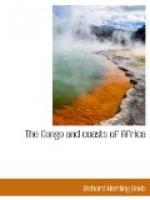To the poor the ways of the truly rich are past finding out. After a man has attained a fortune sufficient to keep him in yachts and automobiles, one would think he could afford to indulge himself in the luxury of being squeamish; that as to where he obtained any further increase of wealth, he would prefer to pick and choose.
On the contrary, these Americans go as far out of their way as Belgium to make a partner of the man who has wrung his money from wretched slaves, who were beaten, starved, and driven in chains. This concession cannot make them rich. It can only make them richer. And not richer in fact, for all the money they may whip out of the Congo could not give them one thing that they cannot now command, not an extra taste to the lips, not a fresh sensation, not one added power for good. To them it can mean only a figure in ink on a page of a bank-book. But what suffering, what misery it may mean to the slaves who put it there! Why should men as rich as these elect to go into partnership with one who sweats his dollars out of the naked black? How really fine, how really wonderful it would be if these same men, working together, decided to set free these twenty million people—if, instead of joining hands with Leopold, they would overthrow him and march into the Congo free men, without his chain around their ankles, and open it to the trade of the world, and give justice and a right to live and to work and to sell and buy to millions of miserable human beings. These Americans working together could do it. They could do it from Washington. Or five hundred men with two Maxim guns could do it. The “kingdom” of the Congo is only a house of cards. Five hundred filibusters could take Boma, proclaim the Congo open to the traders of the world, as the Act of Berlin declares it to be, and in a day make of Leopold the jest of Europe. They would only be taking possession of what has always belonged to them.
Down in the Congo I talked to many young officers of Leopold’s army. They had been driven to serve him by the whips of failure, poverty, or crime. I do not know that the American concessionaires are driven by any such scourge. These younger men, who saw the depths of their degradation, who tasted the dirty work they were doing, were daily risking life by fever, through lack of food, by poisoned arrows, and for three hundred dollars a year. Their necessity was great. They had the courage of their failure. They were men one could pity. One of them picked at the band of blue and gold braid around the wrist of his tunic, and said: “Look, it is our badge of shame.”
To me those foreign soldiers of fortune, who, sooner than starve at home or go to jail, serve Leopold in the jungle, seem more like men and brothers than these truly rich, who, of their own free will, safe in their downtown offices, become partners with this blackguard King.
What will be the outcome of the American advance into the Congo? Will it prove the salvation of the Congo? Will it be, if that were possible, a greater evil?




